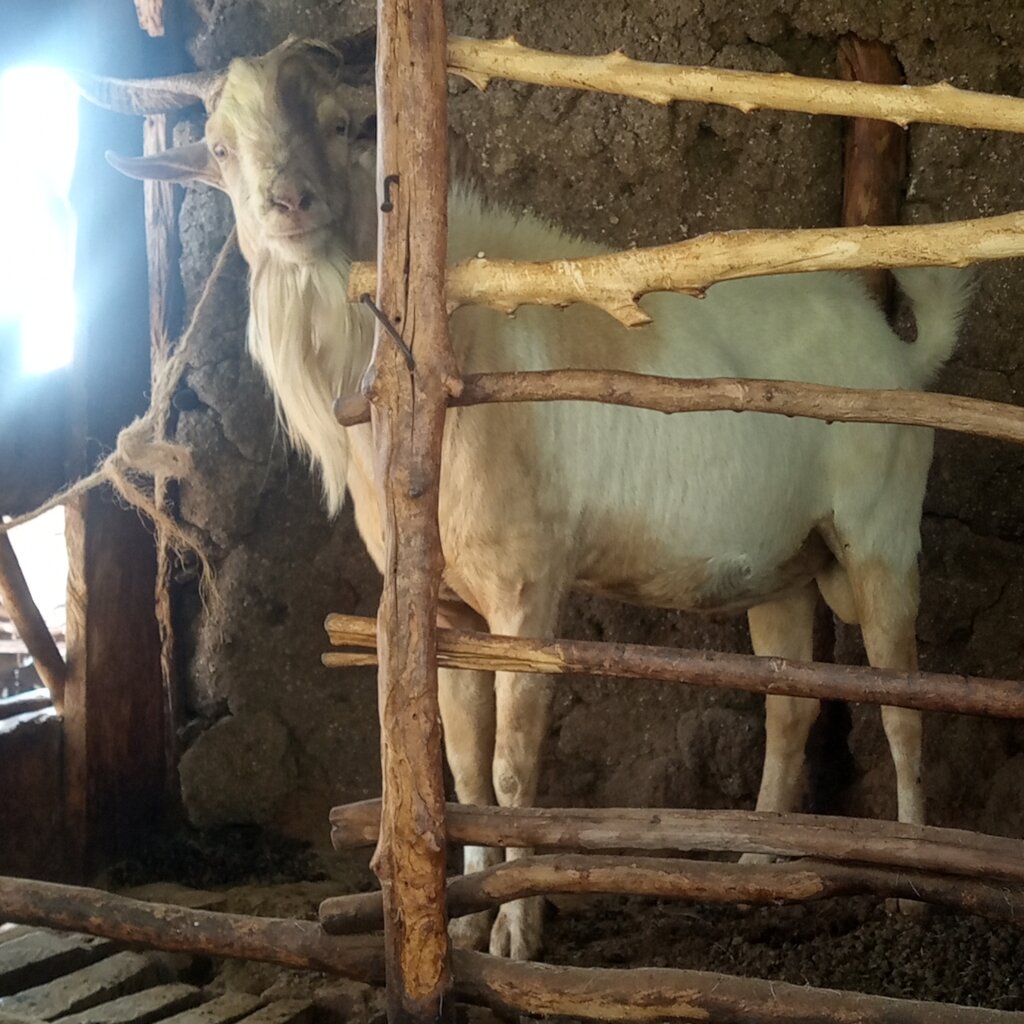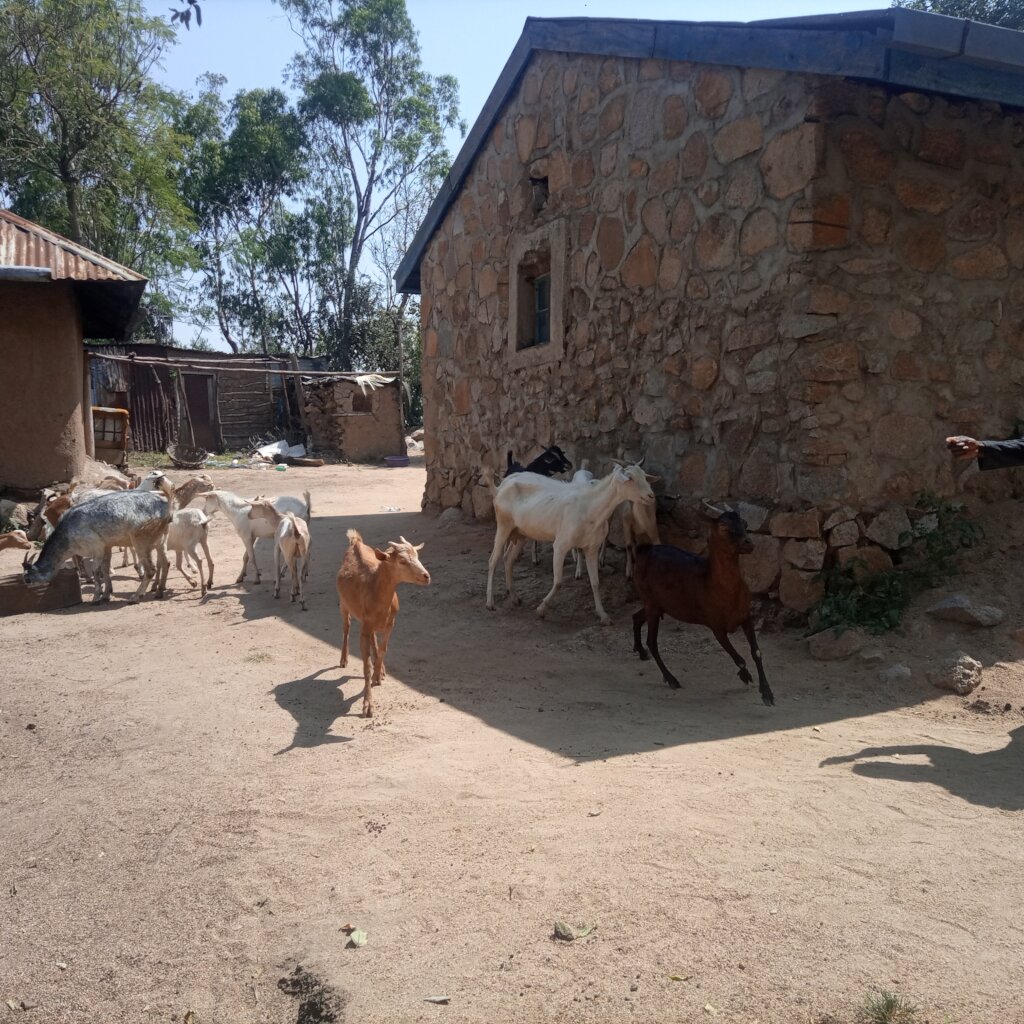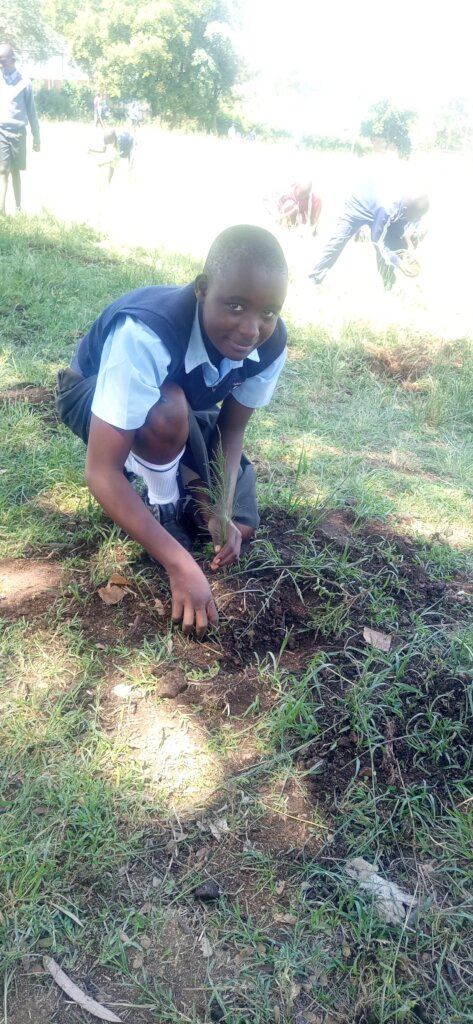By Paul Odalo | Monitoring, Evaluation & Partnership Officer
Introduction
Over the past three months, our organization has been actively engaged in a range of impactful initiatives. These activities have encompassed various aspects of agricultural and environmental development. Notably, we have focused on enhancing dairy goat breeding, facilitating the exchange of new goat breeds among families, and providing training to farmers to equip them with valuable knowledge and skills. In addition, our beekeeping project has gained remarkable traction due to its accessibility and low capital requirement. Despite intermittent rainfall, the enthusiasm of our farmers has remained unwavering, particularly in their commitment to re-greening the environment by actively participating in the cultivation of fruit and forest trees. This report will provide a comprehensive overview of our recent efforts, highlighting the achievements, challenges, and lessons learned during this period.
THE PROJECTS
a) Dairy goat upgrading
In the dynamic agricultural landscape of Homa Bay County, Kenya, our multifaceted initiatives have yielded significant progress over recent months. Central to our efforts is the Dairy Goat Upgrading project, a carefully designed endeavor that introduces exotic hybrid Saanen breed bucks for crossbreeding with the local hardy female goats. This meticulously managed process has generated a robust generation of crossbred offspring known for their hardiness, high yields, and early maturation. Not only do these crossbred goats promise to enhance family livelihoods through highly nutritious goat milk and meat consumption, but they also contribute to family incomes by commanding a premium in local markets. Our project extends its support to vulnerable populations, including orphans, vulnerable children, and widows. Through a zero-grazing management system, we have effectively mitigated the destructive tendencies of goats toward field crops and trees while facilitating the collection of valuable manure and urine. These byproducts, in turn, support kitchen gardening and enhanced fodder production, with leguminous fodder trees and crops playing a pivotal role in enhancing soil fertility and mitigating global warming. This comprehensive report endeavors to illuminate our achievements, challenges, and lessons learned during this reporting period.
Complementing our agricultural endeavors is the Training on Goat Rearing as Business program, which thrives on experiential learning and the appreciation of farmers' prior knowledge, skills, and experiences. Our Farmers Field and Business School methodology has been a resounding success, engaging 182 farmers in hands-on learning across essential aspects of goat rearing, from understanding the economic importance of the practice to mastering proper care and management techniques. The school's curriculum spans a range of topics, including common dairy goat breeds, housing, breeding, health care, and record-keeping.
A heartwarming testament to the transformative impact of these initiatives comes from Mama Erina, a dedicated goat farmer who has experienced a positive shift in her life and her family's well-being. Through our projects, she has achieved the successful sale of goats, providing funds to support her children's education and daily sustenance. Her journey serves as an inspiring call to fellow community members, encouraging them to take goat farming seriously. Furthermore, we are proud to report substantial achievements in the Goat Rearing Project, with 25 new families joining our efforts, bringing the total to 260 actively participating families. The project has benefited approximately 1,300 people, with 60% of the target participants reporting significant increases in household income, improved nutrition, and enhanced environmental health through the use of goat manure. This success underscores the growing adoption of the dairy goat upgrading scheme, with a majority of local community members embracing a stronger breed of goats that yield high-quality milk and meat, making them sought-after commodities in local markets.
b) Bee keeping
Beekeeping significantly enhances crop production by playing a pivotal role in the pollination of crops that form the backbone of our food supply. The introduction of beekeeping in our project area has led to a steady increase in the bee population, thereby positively impacting crop yields and subsequently improving food security and nutrition. Honey, a byproduct of beekeeping, assumes a critical role in not only sweetening our lives but also in the control and management of various health conditions, including the ongoing battle against the coronavirus and other respiratory ailments.
During the reporting period, we distributed beehives to 30 new farmers into our beekeeping project, each receiving a beehive, and now, increasing the number of bee farmers to 385 actively participating. In the previous season, these farmers successfully harvested, processed, packaged, and marketed 221 kilograms of honey, resulting in improved household incomes for 31 families and benefiting approximately 155 individuals. As a result of our bee colonies, around 200 acres of farmland experienced enhanced crop harvests in terms of both quality and quantity.
In our commitment to bolster production, ensure sustainability, and empower project ownership, we provided comprehensive training to 30 new beekeepers during this period. This training encompassed essential areas, such as apiary management, modern beekeeping rules, the responsibilities of a beekeeper, hive types and design, beekeeping equipment, optimal harvest timing and procedures, managing bee pests, understanding bee products, maintaining accurate records, and effective marketing strategies. These initiatives collectively contribute to our broader goals of sustainable agriculture and improved livelihoods within our community.
c) Environmental conservation by planting and growing of both forest and fruit trees
In our commitment to environmental conservation, our project places a strong emphasis on planting and nurturing both forest and fruit trees. The significance of fruit trees extends beyond their economic value; they also serve as essential components in climate change mitigation, household economic empowerment, and improved nutrition. It is within this context that our project strives to be a transformative force.
We utilize the landscapes created by fruit trees as a foundational element for enhancing the mental, physical, economic, and environmental well-being of the community. The integration of fruit trees and agroforestry trees plays a pivotal role in expanding permaculture principles, enabling households within our project area to embrace and benefit from climate-smart agricultural practices. During the reporting period, we distributed 2,550 fruit trees and 21,865 agroforestry trees, reclaiming 20.5 acres of land and positively impacting approximately 65,000 people.
Additionally, we are proud to involve the youth, especially those in schools in our tree planting efforts. Their dedication to nurturing the trees they've planted reflects our shared commitment to the growth and sustainability of this vital initiative.
d) Sustainability
To ensure long-term sustainability and foster community social capital, our organization has implemented a strategic "Passing on the Gift" methodology. This approach serves as a cornerstone of our community development strategy, encouraging the exchange and sharing of valuable resources, including knowledge, experiences, and livestock, among community members.
Farmers who have received direct support from our organization, such as goats, actively engage in the project's growth by passing on a kid of a goat to fellow group members. This collaborative effort forms the foundation of our sustainability framework. In the most recent reporting period, we witnessed six (6) farmers successfully passing on a goat each to six new farmers, and we anticipate a further 27 farmers will continue this tradition by extending the gift to 27 new farmers in November 2023. This ongoing cycle of support and resource sharing strengthens community bonds and ensures the enduring success of our initiatives.
e) Challenges
One of the primary challenges we confront in our project areas is the impact of global warming, which is manifesting as unpredictable and unreliable rainfall patterns. This climatic instability has had significant repercussions, particularly concerning the establishment of adequate fodder for our livestock. The resultant dietary changes have taken a toll on the health of our goats, thereby adversely affecting both meat and milk production. This decline in production has further contributed to a sluggish rate of stock growth. Moreover, the formidable challenge of managing the cost associated with the care of exotic bucks looms large, posing a major hurdle for the majority of farmer groups and, unfortunately, resulting in the loss of several breeding bucks.
f) Mitigation
To address the challenges posed by global warming, we have implemented a series of mitigation measures. These efforts include continued monitoring and close supervision of our farmers. Additionally, our comprehensive training programs have significantly bolstered their capacity to adopt climate-smart agricultural techniques, especially in the cultivation of fodder. Practices such as the 'Tumbukiza' method and fodder preservation have been enthusiastically embraced by a substantial number of our farmers. Furthermore, the selection of farmers responsible for breeding bucks is based on their demonstrated commitment to the sustainability and effective management of these crucial breeding assets. Their unwavering support goes above and beyond, ensuring the provision of necessary resources to maintain and manage the breeding bucks, thereby safeguarding the long-term success of our projects.
g) Partnerships
The Mango Tree places a strong emphasis on fostering partnerships and collaborations in alignment with the principles outlined in the Sustainable Development Goals. These alliances serve multiple purposes, including capacity building, information sharing, and research, all aimed at enhancing productivity in all our projects. We are actively engaged in partnerships with several service providers, including:
Conclusion
In the past three months, our endeavors have demonstrated that a holistic approach to agriculture, environmental conservation, and community empowerment can pave the way for sustainable development. Through our dairy goat upgrading, beekeeping, and environmental regeneration initiatives, we have witnessed the transformative power of collaborative efforts.
Our commitment to fostering community social capital through the "Passing on the Gift" methodology has not only enriched lives but also laid the foundation for a self-sustaining future. Despite the challenges posed by global warming, our mitigation measures have enabled us to adapt and thrive. Additionally, our strategic partnerships and collaborations with various stakeholders exemplify our dedication to the principles of sustainability and community development.
As we move forward, we remain committed to our mission of improving livelihoods, enhancing environmental health, and strengthening communities. The progress made in the past three months serves as a testament to the positive impact that can be achieved when we work together towards a common goal. We will continue to monitor, adapt, and strive for even greater success in the future.
Project reports on GlobalGiving are posted directly to globalgiving.org by Project Leaders as they are completed, generally every 3-4 months. To protect the integrity of these documents, GlobalGiving does not alter them; therefore you may find some language or formatting issues.
If you donate to this project or have donated to this project, you can receive an email when this project posts a report. You can also subscribe for reports without donating.
Support this important cause by creating a personalized fundraising page.
Start a Fundraiser

